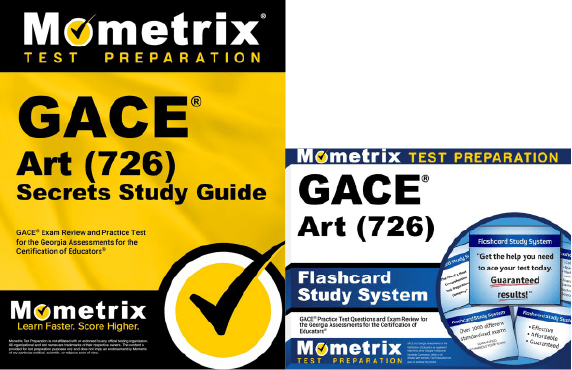If you need help studying for the GACE Art test or just want some more information about what the test is like, you’ve come to the right place!
Click below to take a free GACE Art practice test!
What’s on the Test?
The GACE Art (726) test contains 100 multiple-choice questions and is timed at 2.5 hours.
The exam is split into four testlets, which are taken in separate testing sessions (but can be taken on the same day if you’d like).
Elements of Art and Principles of Design (314)
20 questions | 30 minutes
- Understanding art elements and design principles
- Characteristics and qualities of art elements and design principles
- Comparing and contrasting different artworks
- Analyzing how arty elements and design principles have been used to create and communicate meaning in given artworks
- Creating appropriate instruction
Art Media, Tools, Technologies, Techniques, Terminology, and Processes (315)
40 questions | 1 hour
- Media, tools, technologies, techniques, terminology, and processes used in drawing and painting
- Media, tools, technologies, techniques, terminology, and processes used in photography and printmaking
- Media, tools, technologies, techniques, terminology, and processes used in sculpture, ceramics, metalcrafts, fabrics, and fashion
- Media, tools, technologies, techniques, terminology, and processes used in graphic design, digital design, and filmmaking
Visual Arts in Historical and Cultural Context (316)
20 questions | 30 minutes
- Terminology and characteristics of art from around the world throughout history
- Understanding how art relates to its various contexts
Aesthetics, Art Criticism, and Connections (317)
20 questions | 30 minutes
- Aesthetic theories and terminologies
- Various approaches of art criticism
- Ways that visual arts are related and connected to other disciplines
- How life skills are developed through studying and producing art
How to Register
To get started with the registration process, you’ll need to create a MyPSC account on the GaPSC website. You should receive a Georgia Certification ID (GA CERT ID) during this process, which you’ll use for identification throughout the registration and testing process.
The next step is to create an Evaluation Systems GACE account. This account will allow you to register for the exam and pay the testing fee(s).
How the Exam is Scored
The GACE Art test is scored using a scaled scoring method. Here’s how it works:
Scaled Scoring
For every question you answer correctly, you get one point added to your raw score. At the end of the test, your final raw score will be converted to a scaled score.
The reason your raw score is converted to a scaled score is because everyone that takes the test is given a slightly different set of questions. Since everyone has a different arrangement of questions, and because some questions are harder than others, converting your raw score to a scaled score ensures a more even playing field.
Retaking the Exam
If you don’t get the score you want on your first try, that’s okay! You can take the exam again after a mandatory 30-day waiting period.
FAQs
How many questions are on the GACE Art exam?
The exam contains 100 questions.
What is the time limit for the GACE Art exam?
The exam is timed at 2.5 hours.
What is the passing score for the GACE Art exam?
You’ll need to get a final scaled score of at least 220 to pass.
How much does the GACE Art exam cost?
The full testing fee is ($169.
Mometrix Test Preparation is not affiliated with or endorsed by any official testing organization. All organizational and test names are trademarks of their respective owners.



 GACE Study Guide
GACE Study Guide GACE Flashcards
GACE Flashcards